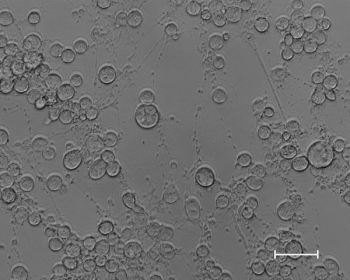
FIP research offers potential insights into Long COVID
New stem cell therapy has shown effective in boosting immune recovery for cats with feline infectious peritonitis.
Researchers at the University of California, Davis, recently discovered that mesenchymal stromal cells therapy (MSC), combined with antiviral drugs, help feline patients' with feline infectious peritonitis (FIP) immune systems recover and reduce systematic inflammation. FIP is caused by a coronavirus and in many ways, behaves like severe coronavirus infections in human by causing widespread inflammation, chronic immune dysfunction, and T-cell exhaustion.
“Our findings support the idea that FIP in cats is a useful model for studying long-term immune problems after a viral infection — something that also happens in some people after illnesses like COVID-19,” said corresponding author Amir Kol, associate professor in the Department of Pathology, Microbiology and Immunology at the UC Davis School of Veterinary Medicine, in an organizational release.1 “It shows that MSC therapy might not only reduce short-term inflammation but help bring the immune system back into lasting balance.”
Patients with FIP
FIP is estimated to affect 2% of cats, with the most common group being young cats living in shelters or catteries.1 Feline patients with FIP are usually infected in the cells lining the patient’s intestines, causing mild stomach issues. In some cats, genetic and environmental factors could potentially alter the virus’ behavior, which can allow it to then infect immune cells and spread through the cat’s entire body. The virus also develops into either wet FIP, which is when fluid builds up in the chest or stomach, or dry FIP, where there is no fluid buildup, but inflammation still affects the patient’s organs. In both cases, patients will present with fever, widespread inflammation, issues in multiple organ, and a drop in important immune cells.
In 2024, Stokes Pharmacy and Bova group joined forces to offer an oral treatment for FIP, the first of its kind.2 The treatment works through a compounded preparation from GS-441524, supported by the drug formula from Bova that was used in clinical research across the globe. For this product, the FDA announced in May 2024 that it was not enforcing new animal drug approval requirements for products compounded from GS-44124 when prescribed to a patient as an FIP treatment.3 Up until this, there was no treatment available and most FIP cases were fatal.
In 2018, researchers at UC Davis actually reported that GS-44124 successfully cured feline patients with FIP, but at the time the patient holder did not apply for approval to sell it.1
RELATED:
Because of this new treatment, there are a few studies tracking patients recovering from FIP long-term with Kol stating some of the patients have enlarged lymph nodes still, meaning a part of their immune system stays active. To researchers, this suggests that even after a patient appears to be recovered, their immune system is still working over, like humans who experience long COVID after recovering from COVID-19. The researchers stated in their study that this ongoing immune stimulate could signify a ‘long FIP’ like syndrome in these patients.
“Even if you treat the infection with antivirals, your immune system, oftentimes, still won't go back to normal or where it was before infection,” explained Kol. “This might have long-lasting effects on your health and this study shows that MSC may help.”
Recent research
In the recent research conducted at UC Davis, 11 cats with naturally occurring effusive FIP were separated into 2 groups, one group was given antiviral drugs along with an infusion of MSc, and the other group received antiviral drugs and a placebo.4
“As expected, all cats survived because the antiviral treatment is effective in getting rid of the virus,” said Kol. “But we definitely saw evidence of immune recovery in those cats that were treated with MSC compared to the ones that weren’t.”
At the end of the study, the team found that the cats treated had fewer overly active T and B cells and more regulatory T cells, with other tests confirming that the therapy helped exhausted immune cells recover and potentially form long-term memory that could protect the patients body in the future. The researchers also noted that they found the treatment safe with no serious side effects.1
The researchers also noted that they found the treatment safe with no serious side effects. The findings from this study will help not only cats with FIP and those who care for them, but also help scientists gain a better understanding of how similar viruses, like COVID-19, impact humans.
“It’s important to understand that many pets suffer from diseases that are similar to human diseases,” Kol concluded. “Veterinary medicine is a wonderful platform to conduct translational science that helps both pets and humans.”
This research was supported by the National Institute of Health and the Center for Companion Animal Health at UC Davis.
References
- What cats may teach us about Long COVID. News release. University of California, Davis. July 14, 2025. Accessed August 12, 2025.
https://www.eurekalert.org/news-releases/1090789 - McCafferty C. Compounded oral FIP treatment is now available. June 14, 2025. Accessed Augst 12, 2025.
https://www.dvm360.com/view/compounded-oral-fip-treatment-is-now-available - FDA announces position on use of compounded GS-441524 to treat FIP. News release. May 10, 2024. Accessed June 14, 2024.
https://www.fda.gov/animal-veterinary/cvm-updates/fda-announces-position-use-compounded-gs-441524-treat-fip#:~:text=The%20FDA%20is%20aware%20of,not%2C%20in%20fact%2C%20legal - Wanakumjorn P, Kimura K, Castillo D, et al. Mesenchymal stem/stromal cell therapy improves immune recovery in a feline model of severe coronavirus infection. Stem Cells Translational Medicine. 2025;14(7). doi:https://doi.org/10.1093/stcltm/szaf025
Newsletter
From exam room tips to practice management insights, get trusted veterinary news delivered straight to your inbox—subscribe to dvm360.





